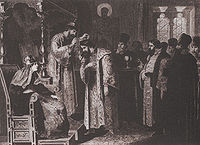Feodor I of Russia
| Feodor I Фёдор I Иванович | |
|---|---|
Ivan IV of Russia | |
| Mother | Anastasia Romanovna |
| Religion | Russian Orthodox |
Fyodor I Ivanovich (Russian: Фёдор I Иванович) or Feodor I Ioannovich (Феодор I Иоаннович; 31 May 1557 – 17 January 1598), nicknamed the Blessed (Блаженный), was Tsar of all Russia from 1584 until his death in 1598.
Feodor's mother died when he was three, and he grew up in the shadow of his father,
He is listed in the "Great Synaxaristes" of the Orthodox Church, with his feast day on January 7 (OS).[1]
Background
Feodor was born in
Feodor therefore grew up in the shadow of a distant father, with no mother to succor him, and only his older brother Ivan Ivanovich for family solidarity. He grew to be sickly of health and diffident of temperament. He was extremely pious by nature, spending hours in prayer and contemplation. He was very fond of visiting churches, and would often cause the bells to be rung according to a special tradition in the Russian Orthodox Church. For this reason, he is known to history as Feodor the Bellringer. He is also listed in the Great Synaxaristes of the Orthodox Church, with his feast day on January 7.[2]
Overall he was considered a good-natured, simple-minded man who took little interest in politics. By some reports, he may have had either an intellectual disability or a learning disability. He has been characterized as feeble-minded, possibly due to congenital syphilis, a disease that was ravaging Europe at the time. [3] These characterizations might be criticised as misinterpretations of his nature and behavior.
Marriage
In 1580, Feodor married
However, Feodor and Irina's marriage did not immediately produce children, and may not have even been consummated for some years. It was only in 1592, after almost twelve years of marriage and numerous attempts by the court to cure her perceived barrenness (at the time, the wife was always blamed for the infertility of a couple), that Tsaritsa Irina gave birth to a daughter, who was named Feodosia after her father. Feodor and his wife doted on their daughter, who however died aged two in 1594. There were no other children from the marriage. Boyar families rival to the Godunov clan attempted to convince Feodor to divorce and remarry, but he always rejected the idea.[4]
Reign

Aleksey Kivshenko
In November 1581, Feodor's elder brother
Ivan the Terrible died in March 1584, and Feodor became Tsar. Two months later, on 31 May 1584, he was crowned Tsar and Autocrat of all Russia at Dormition Cathedral in Moscow.
Feodor was only the nominal ruler: his wife's brother and trusted minister
His troubled reign was dramatised by
Foreign policy
Unlike his father, Feodor had no enthusiasm for maintaining exclusive trading rights with the
See also
References
- ^ Great Synaxaristes: (in Greek) Ὁ Ἅγιος Θεόδωρος ὁ Πρίγκιπας. 7 Ιανουαρίου. ΜΕΓΑΣ ΣΥΝΑΞΑΡΙΣΤΗΣ.
- ^ Great Synaxaristes: (in Greek) Ὁ Ἅγιος Θεόδωρος ὁ Πρίγκιπας. 7 Ιανουαρίου. ΜΕΓΑΣ ΣΥΝΑΞΑΡΙΣΤΗΣ.
- ^ Sean Martin - A Short History of Disease- Plagues, Poxes and Civilisations (2019, p. 113)
- ^ a b Natalia Pushkareva, Women in Russian History: From the Tenth to the Twentieth Century
- ^ Cathal J. Nolan, The Greenwood Encyclopedia of International Relations, Greenwood, 2002, page 63
- ^ Chisholm, Hugh, ed. (1911). . Encyclopædia Britannica. Vol. 26 (11th ed.). Cambridge University Press.
- OCLC 428224102.
- ISBN 0-521-43437-8.
- ^ See Hume, David (1983). The History of England from the Invasion of Julius Caesar to the Revolution of 1688. Vol. IV (1778 ed.). Indianapolis, IN: LibertyClassics. p. 376 – via Online Library of Liberty.
- ^ Russia and Britain by Crankshaw, Edward, published by Collins, 126 p. The Nations and Britain series



